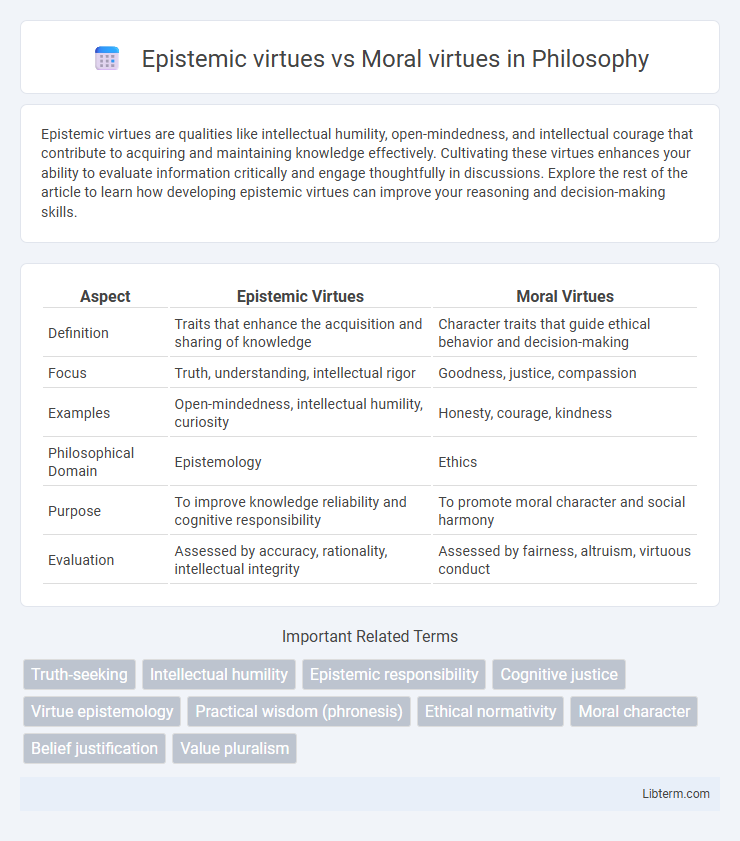Epistemic virtues are qualities like intellectual humility, open-mindedness, and intellectual courage that contribute to acquiring and maintaining knowledge effectively. Cultivating these virtues enhances your ability to evaluate information critically and engage thoughtfully in discussions. Explore the rest of the article to learn how developing epistemic virtues can improve your reasoning and decision-making skills.
Table of Comparison
| Aspect | Epistemic Virtues | Moral Virtues |
|---|---|---|
| Definition | Traits that enhance the acquisition and sharing of knowledge | Character traits that guide ethical behavior and decision-making |
| Focus | Truth, understanding, intellectual rigor | Goodness, justice, compassion |
| Examples | Open-mindedness, intellectual humility, curiosity | Honesty, courage, kindness |
| Philosophical Domain | Epistemology | Ethics |
| Purpose | To improve knowledge reliability and cognitive responsibility | To promote moral character and social harmony |
| Evaluation | Assessed by accuracy, rationality, intellectual integrity | Assessed by fairness, altruism, virtuous conduct |
Introduction to Epistemic and Moral Virtues
Epistemic virtues such as intellectual humility, open-mindedness, and intellectual courage enhance the acquisition, retention, and transmission of knowledge by promoting critical thinking and evidence-based reasoning. Moral virtues like honesty, compassion, and justice guide ethical behavior and decision-making by fostering character traits that support social harmony and individual integrity. Understanding the distinction and interaction between epistemic and moral virtues is essential in fields like philosophy, education, and cognitive science for cultivating well-rounded individuals and communities.
Defining Epistemic Virtues
Epistemic virtues are traits or qualities that promote intellectual excellence and the acquisition of knowledge, such as intellectual humility, open-mindedness, and intellectual courage. These virtues enable individuals to pursue truth responsibly, critically evaluate evidence, and resist cognitive biases. Unlike moral virtues, which focus on ethical behavior and character, epistemic virtues specifically enhance epistemic practices and the reliability of belief formation.
Understanding Moral Virtues
Moral virtues, such as honesty, courage, and compassion, guide ethical behavior and foster social harmony by promoting actions aligned with societal values and principles. Understanding moral virtues involves recognizing their role in shaping character and motivating individuals to act for the common good and personal integrity. Unlike epistemic virtues, which enhance intellectual pursuits like truth-seeking and critical thinking, moral virtues emphasize ethical decision-making and the development of a virtuous character.
Historical Perspectives on Virtue Theory
Historical perspectives on virtue theory distinguish epistemic virtues, such as intellectual humility and open-mindedness, from moral virtues like courage and justice, emphasizing their distinct roles in knowledge acquisition and ethical conduct. Ancient philosophers like Aristotle integrated both types within a unified framework of character development, while later thinkers, including Enlightenment scholars, began to separate intellectual virtues from moral ones to address different domains of human excellence. This division highlights how epistemic virtues contribute to reasoning and truth-seeking, whereas moral virtues guide actions and societal relationships.
Key Differences Between Epistemic and Moral Virtues
Epistemic virtues, such as intellectual humility and open-mindedness, primarily facilitate acquiring, preserving, and transmitting knowledge, whereas moral virtues like courage and compassion guide ethical behavior and interpersonal conduct. Key differences include their objectives--epistemic virtues aim to improve cognitive processes and truth-seeking, while moral virtues focus on character development and social harmony. Furthermore, epistemic virtues are context-dependent, often evaluable through epistemological outcomes, whereas moral virtues engage broader value systems and normative ethics.
The Role of Epistemic Virtues in Knowledge Acquisition
Epistemic virtues such as intellectual humility, open-mindedness, and intellectual courage play a crucial role in knowledge acquisition by enabling individuals to critically evaluate evidence and remain receptive to new information. These virtues foster a reliable process of inquiry, reducing biases and promoting accurate understanding. Unlike moral virtues that guide ethical behavior, epistemic virtues specifically enhance cognitive processes essential for acquiring and sustaining justified beliefs.
Moral Virtues and Ethical Decision-Making
Moral virtues, such as honesty, courage, and justice, play a crucial role in ethical decision-making by guiding individuals to act in ways that align with societal norms and ethical principles. These virtues foster integrity and responsibility, ensuring decisions promote the well-being of others and uphold fairness. Emphasizing moral virtues leads to consistent ethical behavior, reinforcing trust and accountability within communities and organizations.
Overlapping Areas: When Epistemic and Moral Virtues Intersect
Epistemic virtues such as intellectual humility and open-mindedness intersect with moral virtues like honesty and integrity in the pursuit of truth and ethical decision-making. Both sets of virtues promote responsible knowledge acquisition and dissemination, fostering trustworthiness in personal and social contexts. This overlap enhances critical thinking and ethical conduct, crucial for effective problem-solving and collaborative dialogue.
Contemporary Debates on Virtue Classification
Contemporary debates on virtue classification explore the distinctions and overlaps between epistemic virtues, such as intellectual humility and open-mindedness, and moral virtues like honesty and compassion. Scholars examine whether epistemic virtues should be categorized independently based on their unique role in knowledge acquisition or integrated within a broader moral framework due to their ethical implications. This dialogue informs discussions on virtue ethics, cognitive science, and educational practices emphasizing character development.
Conclusion: Integrating Virtues for Personal Growth
Epistemic virtues, such as intellectual humility and curiosity, enhance critical thinking and knowledge acquisition, while moral virtues like honesty and compassion guide ethical behavior and interpersonal relationships. Integrating both sets of virtues fosters holistic personal growth, enabling individuals to pursue truth responsibly and act with integrity. Cultivating epistemic and moral virtues together creates a balanced character that supports effective decision-making and meaningful community engagement.
Epistemic virtues Infographic

 libterm.com
libterm.com